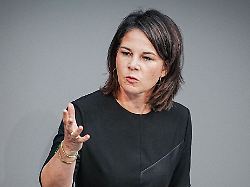“It’s about reliability”
Baerbock calls for rethinking arms exports
03/20/2023, 09:39 am
The Russian war of aggression has made it clear that the armaments of the EU states are “not automatically compatible,” criticizes Foreign Minister Baerbock. This should now change. In addition, a common, responsible line is needed for arms exports – without loopholes.
Federal Foreign Minister Annalena Baerbock has called for a revision of the rules for arms exports within the European framework. “We are now developing a strategy with our partners on how we can cooperate more closely in terms of industrial policy in the armaments sector,” Baerbock told the “Welt”. “That also means that we need a common line for exports.”
Although the European states within the EU and NATO have been working closely together on security and defense issues for a long time, in recent years too little has been done about “what actually means being able to defend oneself,” said the minister. The Russian war of aggression has now shown the states that ammunition and equipment are not automatically compatible with each other.
The stronger cooperation in armaments policy therefore also includes exports. Among other things, it is about the reliability of all partners, Baerbock told the newspaper. She therefore left no doubt that she was also thinking of Germany: In her own party, she had “led intensive discussions that in European joint projects, a country cannot first sign contracts that the partners rely on and then say , we remembered something afterwards,” said the Foreign Minister.
“Dying in the Mediterranean is Europe’s open wound”
Baerbock also called for human rights aspects to be taken into account more uniformly. “We must not thwart what we are building in terms of foreign policy through arms exports,” said Baerbock. “If we condemn the bombing of civilians in the strongest possible terms, we cannot export the ammunition there at the same time.”
That is why “common European rules on where to export” are needed, as well as “what happens when the most serious violations of human rights are committed, whether you can then withdraw from export licenses that have been issued,” she explained.
The Foreign Minister also complained about the discrepancies within the EU about the common migration policy. “The dying in the Mediterranean is Europe’s open wound because we have not managed to come to a common migration and refugee policy,” Baerbock told the newspaper. “As difficult as it is, we must and will continue to work hard on a common position. We must not leave the states on the external borders alone, neither with the people who have been rescued from distress at sea, nor with the people who arrive at the external borders , but are not entitled to asylum and have to be returned.”
European sea rescue “important”
Baerbock had been asked whether the EU needed another sea rescue mission to prevent dozens of people from drowning in the Mediterranean – like recently off the Italian coast. Baerbock said: “We need joint responsibility and we have to strengthen solidarity. That’s why I think it’s so important that there is a European sea rescue service.” The Greens, SPD and FDP had also stipulated this in the coalition agreement.
The EU countries have been arguing about their migration policy for years. In essence, it is about the question of whether and how people seeking protection are distributed in the EU. Because there is no progress, the countries have recently focused primarily on better border protection and cooperation with third countries. Civilian organizations – also from Germany – have been deployed in the central Mediterranean for years to take in migrants and refugees with their ships.
In an interview with “Die Welt”, Baerbock again emphasized that Germany would support Ukraine “as long as necessary” with arms deliveries. Peace is being worked on day and night, she added. In the long run, this cannot be achieved by military means alone. However, negotiations at this point would be little more than blackmail, since “the Russian President is pointing the gun at Ukraine’s head,” said the minister.
